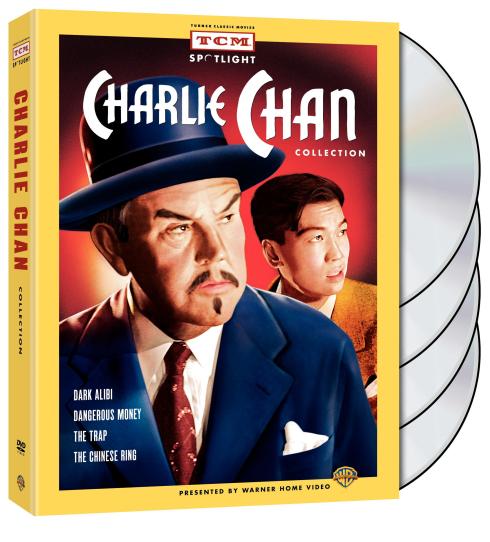
Available from 8th June 2010.
The Charlie Chan Collection is available from Amazon.com.
Chinese-American detective Charlie Chan was created by novelist Earl Derr Biggers in 1923 and went on to feature in fiction, comics, radio, television and at the movies. In all there have been a total of fifty-seven film adaptations of the character.
Warner Oland starred as Chan in 1931’s Charlie Chan Carries On and went on to make a total of 15 films as Chan for Fox. After his death in 1938 Sidney Toler took over as Chan and made another 11 films for Fox. Toler himself bought the rights to the character after Fox ceased production on the Chan movies, and took the character to Monogram Pictures, one of the key minor studios on poverty row, where he continued to star as Chan.
This Chan collection contains three films starring Sidney Toler and one starring his successor Roland Winters.
Charlie Chan has been well served on DVD with five box sets already available, covering a total of 24 of the Fox Chan films. But this four-disc TCM Spotlight set is notable for two key reasons: they contain four Chan films made by Monogram Pictures and the prints have been restored, resulting in an image and sound quality that are remarkably clear for films made on poverty row.
Dark Alibi (Monogram Pictures, dir: Phil Karlson, 1946)
starring Sidney Toler, Mantan Moreland and Benson Fong.
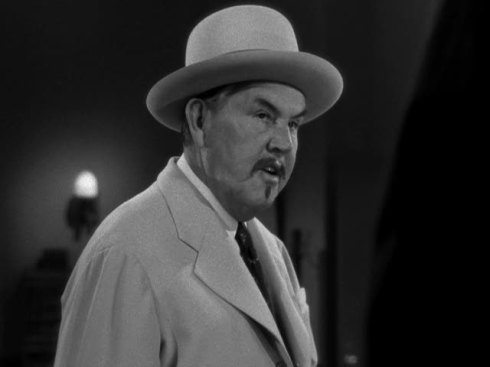
Dark Alibi (1946)
Dark Alibi is the most satisfying of the four films in the set, kicking off with a surprisingly authentic noir sequence: gunmen in dark glasses raid an atmospheric, shadowy bank vault. It’s a visually stark and surprisingly violent sequence, and triggers a narrative about Chan attempting to get an innocent man off death row. As a detective Chan is calm, measured, and experienced – like many detectives he is always one step ahead (in some cases inexplicably so). He is joined by his son Tommy Chan, played by Chinese-American actor Benson Fong, who constantly tries to impress his father with his own amateur sleuthing. Chan’s other sidekick is chauffeur Birmingham Brown, played by Mantan Moreland, and along with Fong provide comic relief as a convincing double act.
The plot of Dark Alibi contains a chain of clues based around fingerprints forgery. The Chan films are clearly B-movies that function in the realm of pulp crime fiction, and for fans of the genre Dark Alibi is a particularly entertaining example of that.
One of the pleasures of B-movies is noticing moments that contrast to mainstream movies. In this case it takes the shape of unusual compositions, such as an economically composed shot of Chan, Brown and Moreland in a car, perfectly composed from an angle towards the side so that all three are in view. When Chan visits the prison cell of the wrongly accused, through the bars we see a back projection of the prison corridor moving off into the distance, producing a striking visual effect.
This is also a really interesting film about race. It is not unusual in American cinema to find Caucasian actors playing characters of different races, and here Chan is played by Toler, a white Scottish-American. The mechanics of Sidney Toler’s performance as Chinese are as follows: a slight accent and affected use of English, prosthetics around his eyes, and a thin beard. While these are certainly symbols associated with stereotypes, in this case they almost act as elements of costume. They become signs for the audience that Toler is playing a Chinese-American character without requiring you to be entirely convinced that he is actually Chinese-American. In that sense the performance is quite self-conscious, as though Toler is letting the audience know that he is only playing a part. This is further backed-up by the juxtaposition of Toler with Benson Fong, the Chinese-American actor who plays his son.
Of course black actors in classical Hollywood were often sidelined into minor parts, parts that perpetuated stereotypes, or ignored altogether. In this series, the actor Mantan Moreland at least is allowed a decent amount of screen time. Yes, he provides much of the comic relief along with Benson Fong, and he does play Chan’s chauffeur, but the space provided to him does allow him to display his talent as a comic actor. One very interesting and funny moment sees Moreland engage in a quick-fire double-act routine with another black actor during the prison sequence, which could have been a routine straight out of vaudeville. Frankly exchanges between two black actors in mainstream Hollywood cinema was very rare at the time, and it suggests that these B-movies and other films by Monogram Pictures catered for audiences neglected by mainstream Hollywood.
Extra Features: None.
Dangerous Money (Monogram Pictures, dir: Terry O. Morse, 1946)
starring Sidney Toler, Mantan Moreland and Victor Sen Yung.
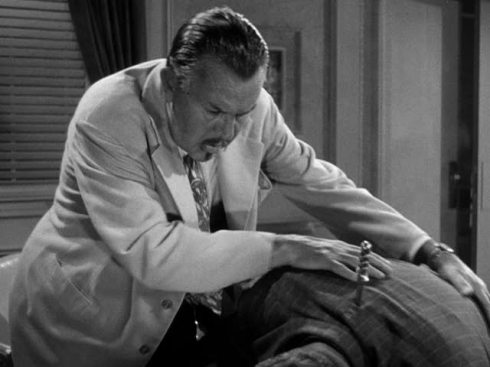
Dangerous Money (1946)
Unlike Dark Alibi, Dangerous Money takes on the shape of a straight whodunit in the mode of Agatha Christie: several confined passengers of different nationalities are all suspected of murdering a member of the United States Treasury Department. There is a knife-throwing assassin on-board to contend with, so skilled that he can throw a knife through impossibly narrow spaces. No one seems to notice that it was actually Chan who led the victim to his death; he persuades him to head to the dining room instead of his own quarters, and he is promptly assassinated. Here Benson Fong is replaced by Victor Sen Yung, playing Chan’s ‘Son Number Two’.
Extra Features: None.
The Trap (Monogram Pictures, dir: Howard Bretherton, 1946)
starring Sidney Toler, Mantan Moreland and Victor Sen Yung.
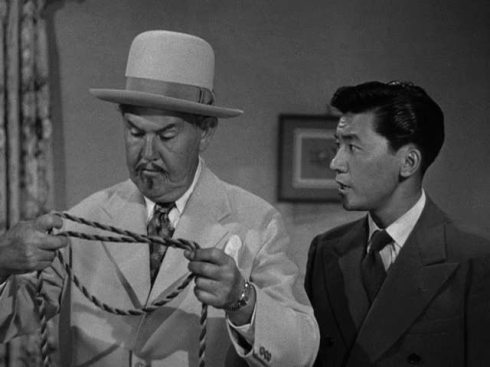
The Trap (1946)
With pulp crime fiction you can often expect suspension of disbelief to kick in. With this whodunnit tale of showgirls living in a beach house you may require more than usual. When one of their number is strangled, the girls decide to go on living there and continue having carefree fun on the beach. Of course another of their number is swiftly killed. Part of the enjoyment of pulp crime fiction is watching convoluted plots unfold, and there are some enjoyably absurd sequences to be found in The Trap.
Extra Features: None.
The Chinese Ring (Monogram Pictures, dir: William Beaudine, 1947)
starring Roland Winters, Mantan Moreland and Victor Sen Yung.
The only film in the set to star Ronald Winters as Chan, The Chinese Ring concerns a plot about a murdered Chinese princess. It’s a standard pulp narrative, but a series of new vivid characters livens up the action and pull it back from the more contrived moments of the The Trap. Winters steps into the role of Chan with ease, and the transition from Toler is very smooth; after a few minutes you’re completely at ease with Winters as Chan.
Extra Features: None.

The Trap (1946)
About the Prints
B-movies often fall victim to neglect, with titles going out of copyright and damaged, duplicated prints circulating in the public domain. Warner Bros. have done an excellent job in making sure these films look as good as possible. By doing so Warner are giving the films the respect they deserve, and making sure they are presented in as optimal a condition as possible. This is especially admirable in the case of these Monogram titles. Since they weren’t even produced by Warner, the work they have done on this suggests that they have a genuine interest in the preservation of cinema more broadly than their own production history.
Overall
For any fans of Charlie Chan, this is an obvious purchase. But it is also recommended to anyone interested in detective fiction, poverty row cinema, or depictions of race in 1940s cinema. They are also damn entertaining, with excellent prints, and at their hour-long running times they make an easy watch.
Buy The Charlie Chan Collection from Amazon.com.
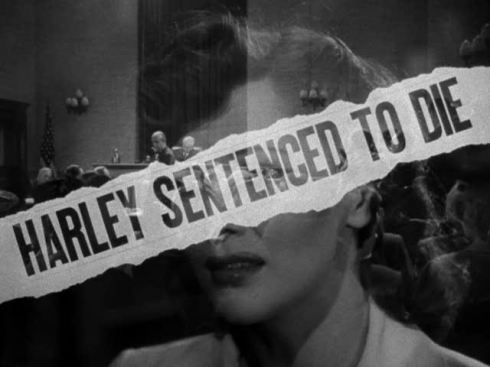
Dark Alibi (1946)




4 comments
Comments feed for this article
June 7, 2010 at 6:17 am
Matthew Coniam
Very interesting stuff, and I can’t wait to get hold of that box-set. Generally speaking these later Chans are felt to be of no interest compared to the earlier Fox ones; like you I’ve always found them enjoyable.
The routine Mantan Moreland launches into in Dark Alibi is most certainly straight out of vaudeville: it became one of this great comic’s signature routines, though it didn’t originate with him. If you’re interested I mention it here: http://carfaxabbey.blogspot.com/2010/03/it-aint-gene-krupa-mantan-moreland-and.html
and a little more on the Chans here:
http://www.movietone-news.com/2007/02/give-chan-chance_9176.html
Best,
Matthew
June 7, 2010 at 1:42 pm
Aman Anand
Mr. Hayes – excellent post.
I must admit that I have never seen a Chan film – but this article has certainly heightened my interest. Which of the Chan films would you recommend for me to begin with?
I was very interested to read your description of Hollywood’s attitude towards Chinese and Chinese-Americans different during this period. Given that China would become a communist state in 1949, it would be fascinating to learn how Hollywood’s depiction of the Chinese evolved during the forties and fifties.
Finally, did you think Toler’s performances in The Trap and Dangerous Money were as convincing as his role in Dark Alibi?
Aman
June 7, 2010 at 7:27 pm
Raquelle
Great review! I’m glad to see you are back to blogging again.
September 5, 2010 at 5:41 pm
Jack
There seems to be a revived interest in Charlie Chan. I was always a fan, particularly of the Warner Oland portrayals but I still enjoy the others as well. I have posted some related information on my vintage music blog at view-source:http://bostonblakie.blogspot.com/